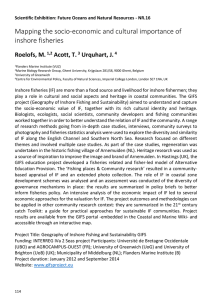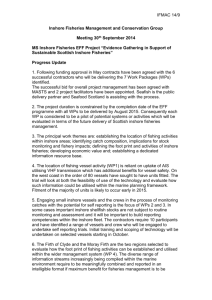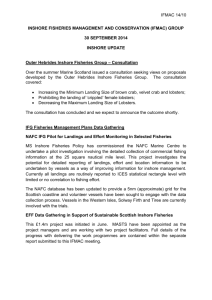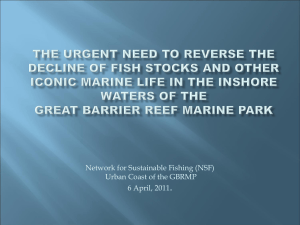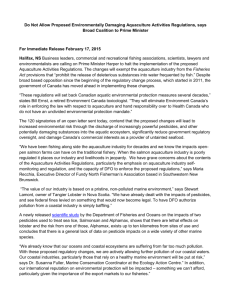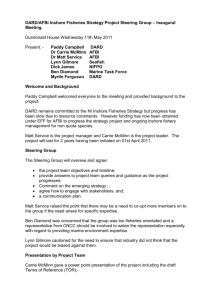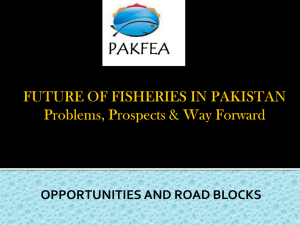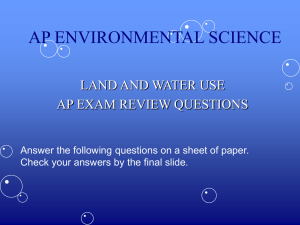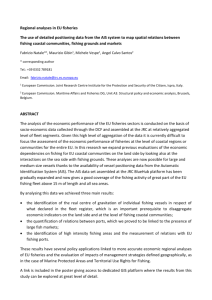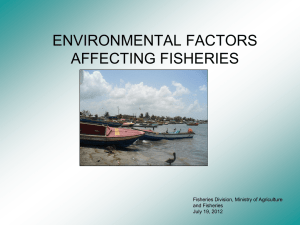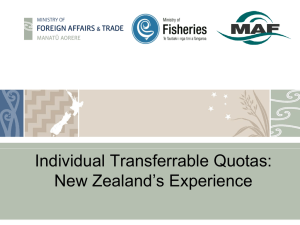Opening Statement Fisheries Report 100614
advertisement
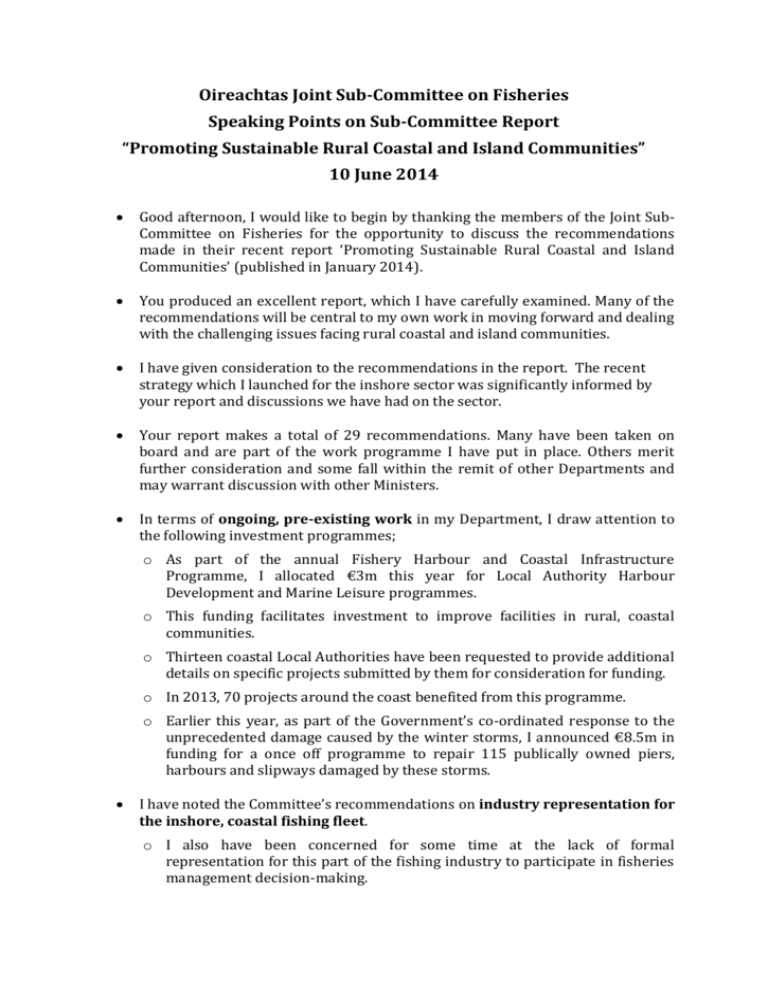
Oireachtas Joint Sub-Committee on Fisheries Speaking Points on Sub-Committee Report “Promoting Sustainable Rural Coastal and Island Communities” 10 June 2014 Good afternoon, I would like to begin by thanking the members of the Joint SubCommittee on Fisheries for the opportunity to discuss the recommendations made in their recent report ‘Promoting Sustainable Rural Coastal and Island Communities’ (published in January 2014). You produced an excellent report, which I have carefully examined. Many of the recommendations will be central to my own work in moving forward and dealing with the challenging issues facing rural coastal and island communities. I have given consideration to the recommendations in the report. The recent strategy which I launched for the inshore sector was significantly informed by your report and discussions we have had on the sector. Your report makes a total of 29 recommendations. Many have been taken on board and are part of the work programme I have put in place. Others merit further consideration and some fall within the remit of other Departments and may warrant discussion with other Ministers. In terms of ongoing, pre-existing work in my Department, I draw attention to the following investment programmes; o As part of the annual Fishery Harbour and Coastal Infrastructure Programme, I allocated €3m this year for Local Authority Harbour Development and Marine Leisure programmes. o This funding facilitates investment to improve facilities in rural, coastal communities. o Thirteen coastal Local Authorities have been requested to provide additional details on specific projects submitted by them for consideration for funding. o In 2013, 70 projects around the coast benefited from this programme. o Earlier this year, as part of the Government’s co-ordinated response to the unprecedented damage caused by the winter storms, I announced €8.5m in funding for a once off programme to repair 115 publically owned piers, harbours and slipways damaged by these storms. I have noted the Committee’s recommendations on industry representation for the inshore, coastal fishing fleet. o I also have been concerned for some time at the lack of formal representation for this part of the fishing industry to participate in fisheries management decision-making. o Inshore fishermen are more reliant on non-quota species such as lobster, crab and a range of bivalve shellfish, so the conversations on quota management, with offshore fishing representatives, don’t address inshore challenges. o For that reason, I announced last month the establishment of the National Inshore Fisheries Forum (NIFF) for the inshore fishing sector, built on a foundation of regional forums. o The National Forum will be representative of the “under 12m” fishing fleet, i.e. fishing boats of less than 12m overall length. o The focus will be on fisheries management within 6 nautical miles and facilitate two-way conversations on issues of mutual concern, industry priorities, emerging policies & initiatives. o The National Forum will be founded on a regional network of forums based in the FLAG (Fisheries Local Action Group) regions. o This regional approach recognises that there are separate inshore needs in different regions around the coast due to variations in fishing seasons, stocks, etc so one-size-fits-all models may not work well for inshore challenges. o Each FLAG area has been asked to support the setting up of a Regional Inshore Forum (RIF) to be representative of the local inshore fishing industry of its region. o Financial assistance will be provided for out-of-pocket expenses to representatives on the Forums. o Each Regional Inshore Forum will nominate 2 delegates to represent the region at the National Forum. o Regional Forums can develop fisheries management initiatives relevant to their region and put them forward at the National Forum for wider industry consideration. o Full terms of reference and guidelines for the Forums are currently in preparation. o I look forward to receiving proposals from the National Forum concerning inshore fisheries policies. At the time I announced the Forum structures, I also announced funding schemes relevant to inshore fishermen in coastal communities and the islands. o These schemes are dedicated to supporting the inshore fisheries sector which, taken together, represent a package of €1m and is in addition to the €600,000 in co-funding by the Government and the European Fisheries Fund available to the coastal and island communities through the FLAGs. o The Shellfish Pot Replacement Scheme, administered by BIM, is providing 40% of the cost of replacing these lost pots through fixed payments of €24 per lobster/crab pot and €12 per shrimp pot. o Due to the limited uptake of the original scheme, I have extended the scheme, more than doubling the pot limits from 50 to 200 for boats less than 12m length and from 100 to 250 for boats from 12 to 15m in length. o Existing applicants to the current scheme will automatically be increased to the supplementary pot limits and a call for new applications is being advertised. o The new Sustainable Inshore Fisheries Scheme will provide funding for environmentally-friendly fishing gear and equipment, and support for improvements in the areas of quality, hygiene, and standards on board. o In addition the scheme will increase the grant aid for voluntary v-notching lobsters from the existing maximum of 55% to a new maximum of 75% to entice more fishermen to participate in this worthwhile conservation activity. In relation to aquaculture, I have noted carefully the recommendations made by the Sub-Committee. o All applications for aquaculture licences are considered under the provisions of the 1997 Fisheries (Amendment) Act and the 1933 Foreshore Act. o Decisions in individual cases are made only following the most rigorous assessment of the technical, scientific, environmental and public policy aspects of each application. o I have noted the recommendation in relation to the allocation of resources for the processing of aquaculture licenses and renewals. o My Department, in conjunction with the Marine Institute and the National Parks and Wildlife Service (NPWS) of the Department of Arts, Heritage and the Gaeltacht, is engaged in a comprehensive programme to gather the necessary baseline data appropriate to the conservation objectives of ‘Natura 2000’ areas. o This data collection programme is substantially complete. o Analysis of the data, together with the setting of appropriate conservation objectives by the NPWS, will enable all new, renewal and review applications to be appropriately assessed for the purpose of ensuring compliance with the EU Birds and Habitats Directives. o The Appropriate Assessment process represents a significant financial, administrative and scientific investment by the State in resolving this issue. o My Department continues to make every effort to expedite the determination of all aquaculture applications having regard to the complexities of each case and the need to comply fully with all national and EU legislation. o In relation to sea lice and the recommendation on the publication of the results of the Marine Institute’s inspections, the existing position is that Ireland’s sea lice control protocols are operated by the Marine Institute and involve regular inspections of marine fin fish sites by Marine Institute Inspectors. o These protocols are more advanced that those operated in other jurisdictions for the following reasons: 1) The inspection regime is totally independent of the industry. 2) Data obtained as a result of inspections is published and made widely available. 3) Treatment trigger levels are set at a low level. o Results of inspections are provided to the farm operators within 5 working days. o Results are also reported to the Department and to other interested parties such as Inland Fisheries Ireland. Overall results and trends are published annually. I have noted the recommendation in relation to the development of the seaweed industry. o My Department is responsible for the issue of aquaculture licences in respect of the cultivation of seaweed. o The Department of Environment, Community and Local Government is responsible for the issue of licences in relation to seaweed harvesting. This o Both Departments maintain ongoing communication in relation to foreshore matters. It is important that both the farmed and wild industries have maximum synergy and accordingly I am asking my Department to engage with the Department of Environment, Community and Local Government to ensure effective co-ordination in licensing both sides of the industry. In relation to fisheries and aquaculture development, I must have regard to the Common Fisheries Policy, taking account of environmental sustainability as well as economic, social and employment benefits, and a wide range of environmental and food safety legislation. In addition, stakeholders need to be afforded opportunity to express how proposals may affect their interests. There are a number of existing structures for engaging stakeholders, soon to be joined by the newly-announced inshore forums, which are an appropriate location for dialogue on issues addressed in the report. I look forward to discussing your recommendations in further detail and I’m happy to take any questions you may have. ENDS
